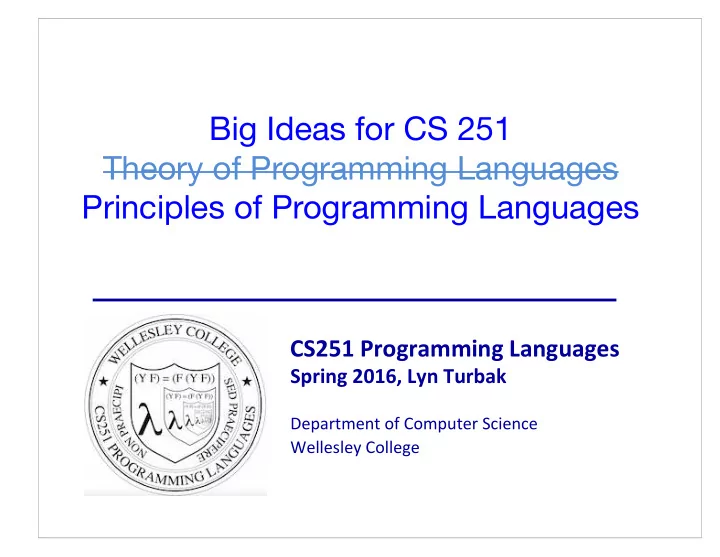

Big Ideas for CS 251 Theory of Programming Languages Principles of Programming Languages CS251&Programming&Languages& Spring&2016,&Lyn&Turbak& ! Department!of!Computer!Science! Wellesley!College!
Discussion: P rogramming L anguages Your experience: • What PLs have you used? • Which PLs/PL features do you like/dislike. Why? More generally: • What is a PL? • Why are new PLs created? – What are they used for? – Why are there so many? • Why are certain PLs popular? • What goes into the design of a PL? 1-2
General!Purpose!PLs! Perl Java Python Fortran Racket& ML JavaScript Haskell Ruby C/C ++ CommonLisp 1-3
Domain!Specific!PLs! HTML& CSS Excel OpenGL R Matlab LaTeX IDL Swift PostScript ! 1-4
Programming!Languages:!Mechanical!View!! A!computer!is!a!machine.!Our!aim!is!to!make! the!machine!perform!some!specified!acDons.!! With!some!machines!we!might!express!our! intenDons!by!depressing!keys,!pushing! buHons,!rotaDng!knobs,!etc.!!For!a!computer,! we!construct!a!sequence!of!instrucDons!(this! is!a!``program'')!and!present!this!sequence!to! the!machine.!!! !!!!!!–!Laurence!Atkinson,!Pascal!Programming! 1-5
Programming!Languages:!LinguisDc!View!! A!computer!language!…!is!a!novel!formal! medium!for!expressing!ideas!about! methodology,!not!just!a!way!to!get!a!computer! to!perform!operaDons.!!Programs!are!wriHen!for! people!to!read,!and!only!incidentally!for! machines!to!execute.!!!!!! !!!!!!!!!!!!!!! – !Harold!Abelson!and!Gerald!J.!Sussman! 1-6
� Religious � !Views! The!use!of!COBOL!cripples!the!mind;!its!teaching!should,!therefore,!be! regarded!as!a!criminal!offense.!–! Edsger!Dijkstra ! It!is!pracDcally!impossible!to!teach!good!programming!to!students!that! have!had!a!prior!exposure!to!BASIC:!as!potenDal!programmers!they!are! mentally!muDlated!beyond!hope!of!regeneraDon.!!–! Edsger!Dijstra! You're!introducing!your!students!to!programming!in!C?!!!You!might!as!well! give!them!a!frontal!lobotomy!!!–! A!colleague!of!mine ! A!LISP!programmer!knows!the!value!of!everything,!but!the!cost!of!nothing.!!!!!!!!!!!!!!!!! \!! Alan!Perlis!! I!have!never!met!a!student!who!cut!their!teeth!in!any!of!these!languages! and!did!not!come!away!profoundly!damaged!and!unable!to!cope.!I!mean! this!reads!to!me!very!similarly!to!teaching!someone!to!be!a!carpenter!by! starDng!them!off!with!plasDc!toy!tools!and!telling!them!to!go!sculpt!sand!on! the!beach.!\!! Alfred!Thompson,!on!blocks!languages ! A!language!that!doesn't!affect!the!way!you!think!about!programming,!is!not! worth!knowing.!!!\!! Alan!Perlis! ! 1-7
Programming!Language!EssenDals! PrimiDves! Means!of!CombinaDon! Means!of!AbstracDon! Think!of!the!languages!you!know.!What!means!of!abstracDon!do!they!have?!! 1-8
PL Parts Syntax : form of a PL What a P in a given L look like as symbols? • Concrete syntax vs abstract syntax trees (ASTs) • Semantics : meaning of a PL Static Semantics: What can we tell about P before running it? • – Scope rules: to which declaration does a variable reference refer? – Type rules: which programs are well-typed (and therefore legal)? Dynamic Semantics : What is the behavior of P? What actions does it • perform? What values does it produce? – Evaluation rules: what is the result or e ff ect of evaluating each language fragment and how are these composed? Pragmatics : implementation of a PL (and PL environment) • How can we evaluate programs in the language on a computer? • How can we optimize the performance of program execution? 1-9
Syntax (Form) vs. Semantics (Meaning) in Natural Language Furiously sleep ideas green colorless. Colorless green ideas sleep furiously. Little white rabbits sleep soundly. 1-10
Concrete!Syntax:!Absolute!Value!FuncDon! Logo : to abs :n ifelse :n < 0 [output (0 - :n)] [output :n] end Javascript: function abs (n) {if (n < 0) return -n; else return n;} Java: public static int abs (int n) {if (n < 0) return -n; else return n;} Python: App Inventor: def abs(n): if n < 0: return -n else: return n Scheme: (define abs (lambda (n) (if (< n 0) (- n) n))) PostScript: /abs {dup 0 lt {0 swap sub} if} def 1-11
Abstract!Syntax!Tree!(AST):!! This!AST!abstracts!over!the! concrete!syntax!for!the!Logo,! Absolute!Value!FuncDon! JavaScript,!and!Python! definiDons.!!The!other!definiDons! funcDonDeclaraDon! would!have!different!ASTs.! funcDonName! body! params! condiDonalStatement! abs! n test! then! relaDonalOperaDon! return! return! value! value! rand1! lessThan! varref! intlit! arithmeDcOperaDon! varref! name! name! rand1! 0 n! n! subtract! intlit! varref! value! name! 0 n! 1-12
SemanDcs!Example!1! What!is!the!meaning!of!the!following!expression?! ! (1 + 11) * 10 1-13
SemanDcs!Example!2! Suppose! a !is!an!array!(or!list)!containing!the!three!integer!values!10,!20,!and!30! in!the!following!languages.!What!is!the!meaning!of!the!following!expressions/ statements!in!various!languages!(the!syntax!might!differ!from!what’s!shown).! ! a[1] a[3] a[2] = "foo" a[3] = 17 !! Java! 20! dynamic!index!out!of! staDc!type!error! dynamic!index!out! bounds!error! of!bounds!error! C! 20! returns!value!in! staDc!type!error! Stores!17!in!memory! memory!slot!aeer!a[2]! ! slot!aeer!a[2]! Python! 20! dynamic!list!index!out! stores!“foo”!in! dynamic!list!index! of!range!error! third!slot!of!a! out!of!range!error! JavaScript! 20! “undefined”!value! stores!“foo”!in! Stores!17!in!a[3]! third!slot!of!a! Pascal! 20! staDc!index!out!of! staDc!type!error! staDc!index!out!of! bounds!error! ! bounds!error! App!Inventor! 10! 30! stores!“foo”!in! Stores!17!in!third! second!slot!of!a! slot!of!a! 1-14
PL Dimensions PLs!!differ!based!on!decisions!language!designers!make!in!many!dimensions.!E.g.:! FirstIclass!values:! what!values!can!be!named,!passed!as!arguments!to! • funcDons,!returned!as!values!from!funcDons,!stored!in!data!structures.!! Which!of!these!are!first\class!in!your!favorite!PL:!arrays,!funcDons,!variables?!! Naming :!Do!variables/parameters!name!expressions,!the!values!resulDng! • from!evaluaDng!expressions,!or!mutable!slots!holding!the!values!from! evaluaDng!expressions?!!How!are!names!declared!and!referenced?!What! determines!their!scope?!! State :!What!is!mutable!and!immutable;!i.e.,!what!enDDes!in!the!language! • (variables,!data!structures,!objects)!can!change!over!Dme.!! Control :!What!constructs!are!there!for!control!flow!in!the!language,!e.g.! • condiDonals,!loops,!non\local!exits,!excepDon!handling,!conDnuaDons?!! Data :!What!kinds!of!data!structures!are!supported!in!the!language,!including! • products!(arrays,!tuples,!records,!dicDonaries),!sums!(opDons,!oneofs,! variants),!sum\of\products,!and!objects.!! Types :!!Are!programs!staDcally!or!dynamically!typed?!What!types!are! • expressible?! 1-15
Programming!Paradigms! ImperaDve!(e.g.!C,!Python) : ! ComputaDon!is!step\by\step!execuDon!on!a! • stateful!abstract!machine!involving!memory!slots!and!mutable!data! structures.!! FuncDonal,!funcDonIoriented)!(e.g!Racket,!ML,!Haskell) :!ComputaDon!is! • expressed!by!composing!funcDons!that!manipulate!immutable!data.! ObjectIoriented!(e.g.!Simula,!Smalltalk,!Java) :!ComputaDon!is!expressed!in! • terms!of!stateful!objects!that!communicate!by!passing!messages!to!one! another.!! LogicIoriented!(e.g.!Prolog) :!ComputaDon!is!expressed!in!terms!of!declaraDve! • relaDonships.!! Note:& In!pracDce,!most!PLs!involve!mulDple!paradigms.!E.g.!! Python!supports!funcDonal!features!(map,!filter,!list!comprehensions)!and! • objects!! Racket!and!ML!have!imperaDve!features.!! • 1-16
Paradigm!Example:!Quicksort! void qsort(int a[], int lo, int hi) { quicksort :: Ord a => [a] -> [a] int h, l, p, t; quicksort [] = [] quicksort (p:xs) = if (lo < hi) { (quicksort lesser) l = lo; ++ [p] h = hi; ++ (quicksort greater) p = a[hi]; where do { lesser = filter ( < p) xs while ((l < h) && (a[l] <= p)) greater = filter ( >= p) xs l = l+1; while ((h > l) && (a[h] >= p)) h = h-1; if (l < h) { t = a[l]; a[l] = a[h]; FuncDonal!Style!(in!Haskell)! a[h] = t; } } while (l < h); a[hi] = a[l]; a[l] = p; ImperaDve!Style! qsort( a, lo, l-1 ); !(in!C;!Java!would!be!similar)! qsort( a, l+1, hi ); } 1-17 }
Pragmatics: Metaprogramming PLs!are!implemented!in!terms!of! metaprogams !=!programs!that! manipulate!other!programs.!! This!may!sound!weird,!but!programs!are!just!trees!(ASTs),!so!a! metaprogram!is!just!a!program!that!manipulates!trees!(think!a! more!complex!version!of!CS230!binary!tree!programs).!! ImplementaDon!strategies:!! Interpreta(on :!interpret!a!program!P!in!a!source!language!S!in!terms!of!an! • implementaDon!language!I.!! Transla(on-(compila(on) :!translate!a!program!P!in!a!source!language!S!to!a! • program!P’!in!a!target!language!T!using!a!translator!wriHen!in! implementaDon!language!I.!! Embedding :!express!program!P!in!source!language!S!in!terms!of!data! • structures!and!funcDons!in!implementaDon!language!I.!! Bootstrapping puzzles: how do we write a Java-to-x86 compiler in Java? 1-18 !
Metaprogramming:!InterpretaDon! Program!in! Interpreter!! Machine!M! language!L!! for!language!L!! on!machine!M! 1-19
Metaprogramming:!TranslaDon! Program!in! Program!in! language!A!! A!to!B!translator!! language!B! ! Interpreter!! Machine!M! for!language!B!! on!machine!M! 1-20
Recommend
More recommend